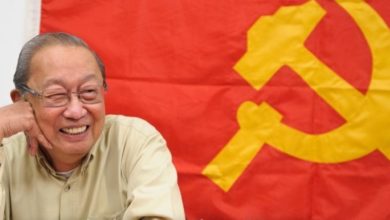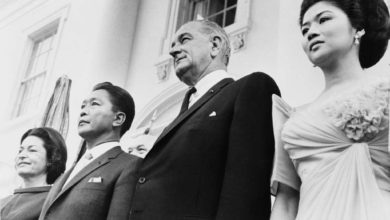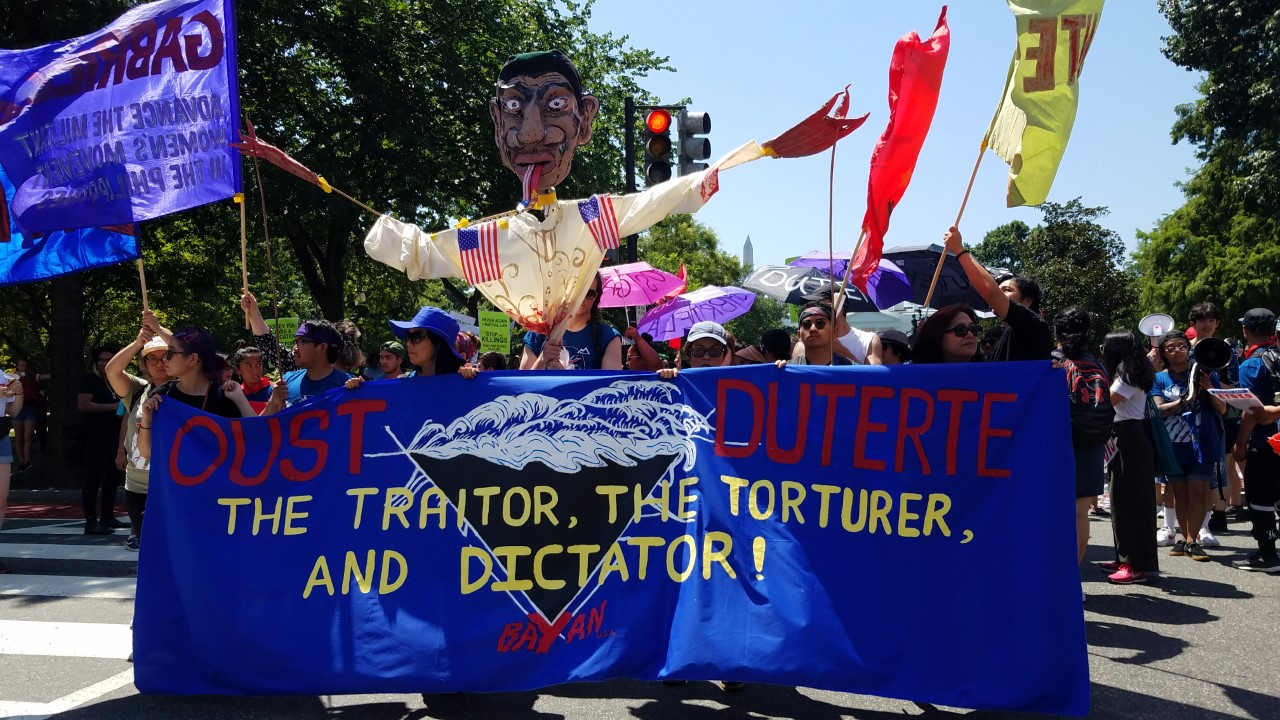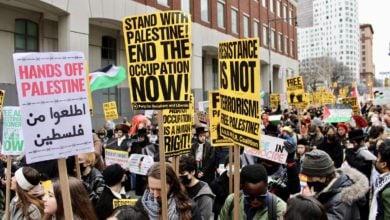The following are excerpts of a statement by Jose Maria Sison, General Consultant for the International League of Peoples’ Struggle. The statement was delivered to an Oct. 9 consultation in Seattle to prepare for the Second International Assembly of the ILPS, scheduled for November in the Netherlands. It has been edited slightly for style.
Since the founding of the International League of Peoples’ Struggle in 2001, the crisis of the world capitalist system has worsened in a big way. No less than the United States has been struck hard by the global crisis of overproduction and by financial crisis of unprecedented proportions. These crises have brought about round after round of economic and social devastation through out the world, in the underdeveloped and dominated countries as well as in the imperialist countries.
The Bush regime has merely aggravated the crisis by further squeezing the U.S. proletariat with policies that have brought about the current high unemployment rate, reduced incomes and cutbacks on social spending. On the other hand, the same policies have favored the monopoly bourgeoisie with tax cuts and increased military production. The regime has launched wars of aggression such as those against Afghanistan and Iraq to acquire sources and supply routes of oil and other raw materials, markets, fields of investment and spheres of influence.
The attacks of September 11, 2001, involving the killing of nearly 2,800 civilians, have been used by the U.S. imperialists as the pretext for their own grand-scale terrorism, killing many times more civilians and destroying the social infrastructure and livelihood of millions of people in wars of aggression. The U.S. terrorizes entire peoples with high-tech weapons of mass destruction and pushes the repression of the people in its own territory, in other imperialist countries, and in dominated countries.
The rulers of the U.S. are big war criminals. They have invaded and occupied Iraq and destroyed the lives and properties of the Iraqi people in wanton violation of the UN charter which prohibits preemptive wars, wars of aggression and wars without the explicit and clear decision of the UN Security Council to carry them out for reasons of collective security. Even UN Secretary General Kofi Annan, an old trustee of the U.S., has been compelled by circumstances to declare that the U.S. war against Iraq is illegal.
The Bush regime lied and misled the U.S. public about the presence of weapons of mass destruction in Iraq in order to use its own weapons of mass destruction against Iraq and the Iraqi people. The U.S. attacked Iraq precisely because it knew that this country had no weapons of mass destruction to counter U.S. aggression. And its overriding objectives are the seizure of the oil resources and the so-called reconfiguration of the entire Middle East in order to further control the global oil market and the flow of oil to Western Europe and East Asia. The countries the U.S. imperialists fear most as their current and po tential rivals are in both global regions. This explains the U.S. drive to further control the flow of oil to these regions.
The U.S. is obsessed with maintaining its global hegemony, its sole superpower role, through the possession of high technology and high-tech weaponry and through the control of oil which it describes as the lifeblood of the global economy. It does everything to prevent the flow of oil to Central Europe and China from their sources by what would be far more direct pipelines beyond U.S. control.
The U.S. has dubbed the Philippines as the second front of its so-called war on terror because the U.S.wants to fortify its position in this country for the purpose of grabbing and controlling all the oil resources of Southeast Asia. Together with its British and Dutch allies, the U.S. has started to exploit the gas and oil resources of the Philippines. You are of course aware of the Malampaya project, controlled by the Texaco-Chevron-Halliburton combine and the Royal Dutch Shell. The U.S. imperialists find it convenient to use the Abu Sayyaf [Islamic rebels in the Philippines] as the pretext for military intervention. In the same way that the chieftains of Al Qaeda were in the hire of the CIA in the 1980s, so were the Abu Sayyaf in the first half of the 1990s.
The Resistance of the People
The crisis of the world capitalist system is rapidly worsening. All major contradictions are sharpening. These are between the oppressed nations and people on one hand and the imperialist powers spearheaded by the U.S., between countries and governments assertive of national independence and the imperialist powers, among the imperialist powers themselves and between the proletariat and monopoly bourgeoisie in the imperialist countries.
We can simply speak of a single contradiction in the world, one between the proletariat and peoples on one hand and the imperialist powers headed by the U.S. on the other hand. The ILPS is conscious of such contradiction. But it is necessary to recognize and understand the major types of contradictions because they involve various types of social conditions and relations, various degrees of exploitation and oppression and various types of resistance. The ILPS knows where the main contradiction lies and where the weakest points of imperialism are.
To know different circumstances in dif ferent parts of the world under the single law of uneven development is to know what strategy and tactics can be adopted and applied in certain categories of countries. The extreme conditions of exploitation, oppression and chronic crisis in certain countries, often found in third world and retrogressive countries, allow for protracted peoples’ wars of national liberation. In imperialist countries, the conditions for protracted people’s war do not exist. But at the moment, neither are there conditions of urban insurrection in the imperialist countries, although militant mass protests are spreading.
In stating clearly what are the major contradictions in the world, we can point out what is the main contradiction in terms of the severity of oppression and exploitation, the scale of those oppressed and exploited, the magnitude of profits extracted by the imperialists and the intensity and effectiveness of resistance. At this point the main contradiction is between the imperialist powers and the oppressed peoples and nations in the third world and retrogressive countries.
In these types of countries, so many kinds of resistance are now running. It is important for the ILPS to know and understand these even as it is determined to develop the legal forms of struggle along the anti-imperialist and democratic line. Most of the struggles are legal forms of struggle by the organized masses. But sometimes there are spontaneous outbursts of the hungry and outraged masses. The mass protests are spreading and mounting in various continents and countries because of the worsening crisis. But the armed forms of resistance are the ones that address most directly the question of national liberation or social revolution, which is the question of seizing political power.
There are armed movements for national liberation such as those in Iraq, Afghanistan, Colombia, Nepal, India, Philippines, Palestine, Turkey and Peru. Their resistance objectively helps each other, even as each armed movement has its own strategy and tactics and its own immediate and long-term goals.
Among the current armed struggles, the most focal is that between the Iraqi people on the one hand and the U.S. and its puppets on the other hand. In this struggle, U.S. imperialist troops are getting killed and wounded in significant numbers. The stakes for each side are high. The U.S. expects to keep the oil resources of Iraq and use its military bases in Iraq to control the entire Middle East. The Iraqi people have no choice but to fight for their own national salvation, dignity and liberation. The governments and peoples in neighboring countries also feel the threat of recolonization by the U.S.
The U.S. imperialists can effect the massive destruction of lives and properties in the most cowardly manner with the blitzkrieg use of cruise missiles, airplanes, tanks and the like. But for the U.S. to get the spoils of war, it must deploy on the ground troops and related personnel who are vulnerable to rifle fire, grenades, rocket-propelled gre nades, road side improvised explosive devices, mines, mortars, artillery and so on. After the blitzkrieg of invasion, the fixed positions and supply lines of the occupying power become vulnerable to guerrilla warfare. Moreover, the Iraqi people can repeatedly disrupt and destroy the oil pipelines and other facilities. Thus, the U.S. occupation and the use of the puppet government are rendered unprofitable.
Whether Bush remains in power or Kerry replaces him, the U.S. will continue trying to maintain U.S. military bases in Iraq and own the oil resources of Iraq. The Iraqi people will have no choice but to inflict severe casualties on the U.S. and puppet troops and blow up the oil pipelines and other facilities until the U.S. realizes and decides that it is unprofitable, economically and politically, to occupy Iraq under any pretext.
In addition to developing their own strength, the armed movements for national and social liberation can benefit from the anti-imperialist resistance of countries and governments that are as sertive of national independence (especially China, North Korea and Cuba). They also benefit from the contradictions among the imperialist powers. Contradictions with France, Germany and Russia, plus China, have exposed the extreme greed and aggressiveness of the United States. The exposure of the contradictions and weaknesses of the imperialist powers has encouraged the proletariat and people to carry out anti-imperialist mass actions in imperialist countries and elsewhere.
The national liberation movements, the countries and governments assertive of national independence, the proletariat and people in the imperialist countries can take advantage of the sharpening contradictions of the imperialist countries over economic, finance, trade, security and other issues. As the anti-imperialist struggles in the third world and retrogressive countries advance, so can those of the proletariat and people in imperialist countries. They can build their own strength and use it to fight for democracy against racism, fascism, plunder and war.
At this time, the U.S. is still heading the imperialist powers in misrepresenting and attacking national liberation movements, countries and governments that assert national independence, peoples engaged in revolution and their anti-imperialist leaders as terrorists. By intensifying oppression and exploitation, U.S. imperialists are the very ones most active in rousing the people to fight ever more resolutely and vigorously for their own national and social liberation.
The important role of the International League of Peoples’ Struggle is to ad vance the solidarity of all peoples struggling for liberation and democracy against imperialist plunder and war. In the whole world and in any part of the world, the sovereign will and organized strength of the people are the main driving force for all kinds of resistance against imperialism and all reaction. The broadest possible united front of the or ganized forces of the people can be developed in order to mobilize the greatest numbers of people who are as yet unorganized.
68 7 minutes read






